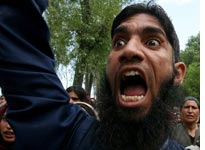 A businessman accused of blasphemy has gone underground and wants the religious leaders to hear his viewpoint.
A businessman accused of blasphemy has gone underground and wants the religious leaders to hear his viewpoint.Haji Nasrullah, who owns a market at Hala Naka area off National Highway and is the chairman of a local shopkeepers association, originally hails from
 Mohmand Agency
Mohmand Agency... Named for the Mohmand clan of the Sarban Pahstuns, a truculent, quarrelsome lot. In Pakistain, the Mohmands infest their eponymous Agency, metastasizing as far as the plains of Peshawar, Charsadda, and Mardan. Mohmands are also scattered throughout Pakistan in urban areas including Karachi, Lahore, and Quetta. In Afghanistan they are mainly found in Nangarhar and Kunar...
According to Munir Abbasi, a police officer at the Hatri cop shoppe, Nasrullah was booked for blasphemy offence under sections 295-B and C on the complaint of Kachkol Khan.
Blasphemy is punishable by life in prison or death under Pak laws. Human rights groups and civil society organizations often call for repealing it on the ground that it is badly misused, particularly against religious minorities for settling personal scores.
Abbasi explains that the trouble began on Sunday night when the city observed a strike against an anti-Islam film.
"Some protesters wanted shops at the Hala Naka area closed in protest against the anti-Islam movie to which Nasrullah objected," he said.
According to Azam Jehangiri, some shopkeepers including the president of the association Najeeb Ahmed reported the matter to a mufti in a nearby mosque. "Ahmed alleged that Nasrullah used some very objectionable remarks against the Holy Prophet," said Jehangiri, who is associated with Maulana Fazal Rehman's Jamaat-e-Islam.
"Mufti Ashfaq asked whether he has witnesses to substantiate his claim. Ahmed accordingly produced those witnesses," Jehangiri recalled.
Subsequently, Abbasi says, after a brief gathering in the area mosque, scores of outraged religious parties activists and seminary students tried to attack Nasrullah's house, leading to a clash.
As a result of firing, three persons namely Abdul Baseer and Mohammad Afzal (who were among protesters) and Qamaruzzaman brother of Haji Nasrullah received injuries.
"Nasrullah got an FIR of attempted murder lodged against the protesters," he said.
Maulana Taj Mohammad Nahyoon, Hyderabad district president JUI (Fazal), is currently spearheading protests against Nasrullah and demanding his arrest.
He had an FIR registered against Nasrullah for alleged blasphemy after addressing a presser at the local press club on Monday afternoon.
"We want Nasrullah placed in durance vile
Keep yer hands where we can see 'em, if yez please!
as we have produced our witnesses against Nasrullah and they all have deposed on oath that he did commit blasphemy," Nahyoon said while talking to Dawn.com.
Meanwhile,
...back at the sea battle, the Terror of the Baltic's career had come to an abrupt and watery end...
Nasrullah has gone into hiding. He has not been placed in durance vile
Keep yer hands where we can see 'em, if yez please!
nor has he been able to seek pre-arrest bail so far. Although he is not answering his cellphone, he has made an effort to get his point across to the Mufti Ashfaq who was instrumental in getting the FIR registered.
On Wednesday, Nasrullah sent Haji Asmatullah Mehsood, who is associated with ANP and runs his business in Hala Naka area, to Jamia Muftahul Uloom. Mehsood met with Nahyoon and Jehangiri as well as other people.
"The gathering was chaired by me and it was attended by Sheikhul Hadees Mufti Ghulam Mohammad Junejo, Mufti Habibullah, Mufti Fasih, Maulana Saifur Rehman, Maulana Abdul Salam and others in seminary," said Nahyoon.
He added that the purpose of the meeting was to verify the 'involvement of personal enmity'.
"This is a sensitive issue. However,
denial ain't just a river in Egypt...
all of us are satisfied that an FIR was properly lodged with statement of witnesses," he said.
"Since the FIR has been lodged after due verification of facts, the issue can't be resolved at this level. Now we want him placed in durance vile
Keep yer hands where we can see 'em, if yez please!
," he said.
Mehsood, on the other hand, confirms having met religious leaders.
"I haven't met Nasrullah...he is not available but someone from his side approached me so that his viewpoint can be presented to the other side," he says, adding: "I have got nothing to do with this issue directly."
Majlis-e-Tahfuz-e-Khatm-e-Nabuwat is also actively participating in protests on the issue and demanding arrest of the accused. They said that they will hold a protest on Friday if he is not placed in durance vile
Keep yer hands where we can see 'em, if yez please!.
